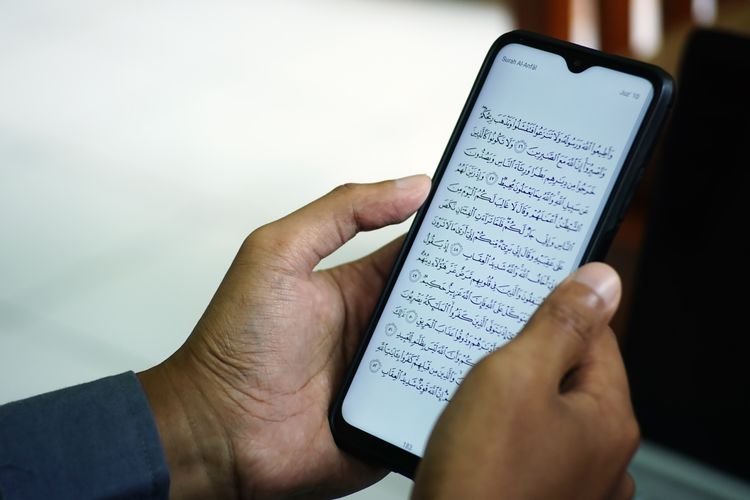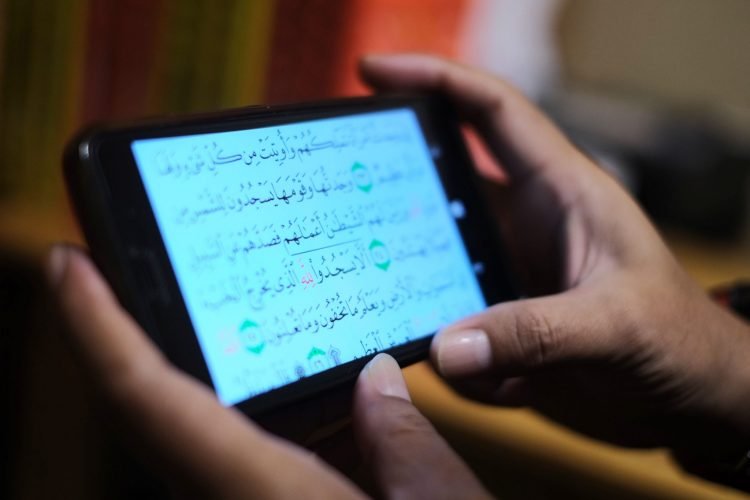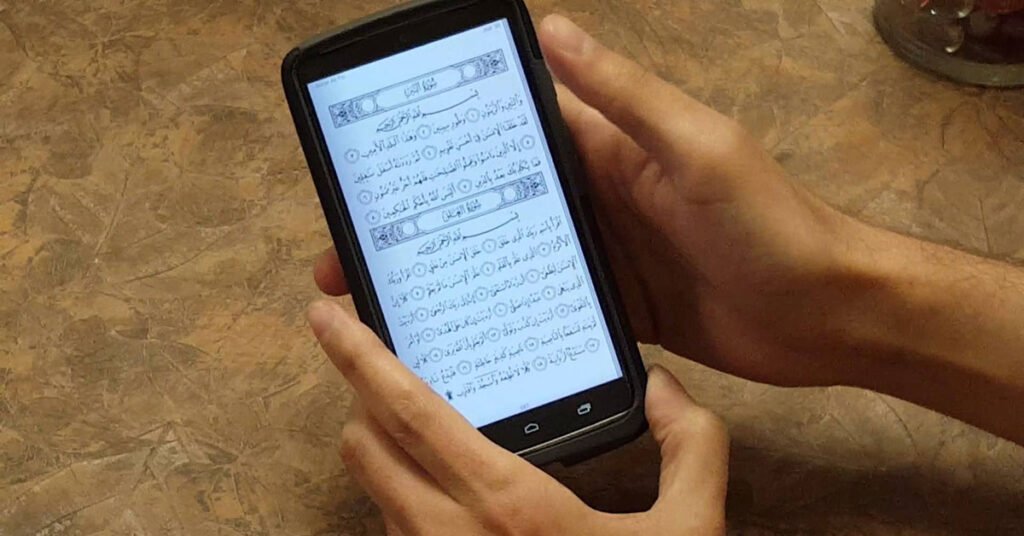Sabil Al-Quran
Can You Read Quran without Wudu On Phone?
In the realm of Islamic practice, many Muslims wonder: Can you read Quran without Wudu on phone? This question arises as technology makes the Quran more accessible. In this article, we will explore the permissibility of reading the Quran on a phone without Wudu, the impact of passing gas during recitation, and whether falling asleep affects one’s state of Wudu.
Join Sabil Al-Quran to uncover these questions, gain deeper insights, and learn how to approach the Quran with the utmost respect.

Can You Recite Quran Without Wudu?
Yes, you can read the Quran without being in a state of wudu. While it’s recommended to maintain ritual purity for acts of worship, such as reading the Quran, it\’s not obligatory.
However, most scholars agree that touching the Quran without wudu is not allowed. Yet, reciting from memory or looking at it without physical contact is permissible.
If you are interested in deepening your understanding and connection with the Quran, consider enrolling in Sabil Al Quran’s online course for memorizing the Quran.
Our course provides expert guidance on proper pronunciation and Tajweed rules while memorizing verses from the Holy Book.
Can You Read The Quran Without Wudu On SmartPhone?
Yes, you can read the Quran on a phone without wudu. According to Islamic scholars, reading the Quran from a digital device like a mobile phone does not require the same level of purity (wudu) as reading from a physical copy (Mushaf).
This is because the text on digital devices is not considered the same as the physical Quran, as it appears and disappears as needed.
Here’s a more detailed explanation:
1. Reading The Quran from Memory vs. Mushaf:
- When reciting the Quran from memory, scholars agree that wudu is not required, although it is recommended to be in a state of purity out of respect for the Quran.
- Reading directly from a physical Mus-haf (printed copy of the Quran) does require wudu, as touching the actual text of the Quran necessitates purity.
2. Reading The Quran on a Digital Device (Mobile Phone):
- Scholars have ruled that reading the Quran from a mobile phone or similar electronic device does not require wudu.
- This ruling is based on the understanding that the Quranic text on digital screens is not the actual Mus-haf; it is a digital representation that does not have the same sanctity as the physical Quran.
3. Opinions of Scholars:
- Shaykh ‘Abd al-Rahman ibn Nasir al-Barrak and Shaykh Salih al-Fawzan have both clarified that it is permissible to read the Quran from a mobile phone without wudu.
- They explain that the Quranic letters on digital devices are in a different form and do not carry the same ruling as the physical Mus-haf.

Is it necessary to perform wudu before reciting the Quran?
No, it is not necessary to perform ablution (wudu) before reading the Quran unless you are going to touch it physically. However, it is highly recommended to perform wudu before reading the Quran, even if you are reading it from a phone or other digital device, as a sign of respect and reverence for the word of Allah.
If a Muslim has a minor state of impurity and intends to touch the physical Quran, then it becomes necessary to perform wudu first. This is because the Quran is considered sacred and should be approached with purity and reverence.
On the other hand, if one is not going to touch the Quran and only intends to read it, it is not necessary to perform wudu. One can recite the Quran without physical contact, such as reading from a screen or reciting from memory.
Tips for Reading the Quran on Your Phone
Reading the Quran on a phone offers convenience and accessibility. However, it’s important to follow certain guidelines to ensure this practice is carried out with the proper respect and mindfulness. Here are some key points to consider:
- Perform Ablution
Ensure you have performed Wudu (ablution) or Ghusl if necessary before reading the Quran on your phone.
- Maintain Cleanliness
Make sure your phone screen is clean before starting your recitation as a sign of respect for the words of Allah.
- Show Reverence
Treat your digital device with the same reverence as you would a physical copy of the Quran.
- Minimize Distractions:
Find a quiet, distraction-free environment where you can fully concentrate on reciting and understanding the verses.
- Use Proper Tajweed
Practice proper pronunciation, enunciation, and rhythm when reciting the Quran on your phone to maintain its beauty and accuracy.
- Reflect on Meaning
Reflect on the meanings of the verses you are reciting by studying Tafsir (exegesis) alongside your digital text.

Is It Acceptable to Read the Quran Online?
Certainly, it is permissible to read the Quran online. Although reading from a printed copy of the Quran is preferable, advancements in technology have made it convenient for individuals to access and read the Quran digitally.
Online platforms serve as valuable resources for individuals who may lack access to a physical copy or for those seeking to comprehend the teachings of the Quran.
Nonetheless, it remains crucial to exercise caution when using online sources and to verify the authenticity and reliability of the content.
Does Sleeping Break Wudu?
Yes, according to Islamic teachings, if someone falls asleep while reading the Quran and their sleep becomes so deep that they are no longer aware, it would invalidate their wudu (ablution).
This is because deep sleep is considered to break the state of ritual purity required for performing acts of worship.
However, if the sleep is not deep enough to make one unaware, then wudu remains valid. It is important to note that sleep in itself does not invalidate wudu unless it reaches a certain level of depth.
Types of Purity and Impurity in Islam
In Islam, there are two types of purity and two types of impurity:
- Types of Purity:
- Tangible Purity: This is the purity from ritual impurity (like performing wudu or ghusl) and tangible impurity (things considered impure by Islamic law).
- Intangible Purity: This refers to the spiritual purity of a believer who is free from associating partners with Allah (Shirk) and disbelief.
- Types of Impurity:
- Tangible Impurity: These are things that Islamic law deems impure and filthy.
- Intangible Impurity: This includes the impurity of disbelief, evildoing, and sin.
If you are interested in mastering the recitation of the Quran and obtaining an ijazah (certification) in its proper recitation, consider enrolling in sabil Al Quran’s online Quran Ijazah course.
How to master the Quran Recitation Online?
In Islam, there are two fundamental types of purity and impurity. Tangible purity refers to the physical state of cleanliness, achieved through rituals such as wudu (ablution) and ghusl (full-body cleansing), as well as avoidance of things deemed impure by Islamic law.
Tangible impurity encompasses substances and actions that are considered ritually unclean or impure. On the other hand, intangible purity relates to the spiritual cleanliness of a believer, free from polytheism (Shirk) and disbelief. Intangible impurity involves moral and spiritual corruption, such as disbelief, wrongdoing, and sin.
If you\’re looking to deepen your understanding of the Quran and earn an ijazah (certification) in its proper recitation, consider enrolling in Sabil Al Quran’s online Quran courses.
Our program offers expert guidance in rules of Quranic recitation, ensuring you learn the Quran with precision and reverence.
Start your journey today and become proficient in reciting the Quran online with proper Tajweed and recitation rules.
Conclusion
In summary, while it is not obligatory to perform ablution (wudu) before reading the Quran, it is highly recommended as a gesture of respect and purity. Engaging in wudu creates a spiritual ambiance conducive to connecting with the sacred text.
Furthermore, it is advisable to refrain from touching the Quran without wudu. It\’s important to note that wudu may not be necessary when reading Quran translations, as they offer interpretations rather than direct recitations from the Arabic text.
If you seek to enrich your understanding and mastery of Quran recitation, consider exploring sabil Al Quran\’s excellent online courses. Led by experienced instructors, these courses offer guidance on the beautiful journey of connecting with Allah through His words.
Frequently Asked Questions (FAQ)
Is reciting the Quran from apps the same as reciting from a physical Mushaf (Quranic text)?
While reciting the Quran from apps offers convenience and accessibility, it may not be considered exactly the same as reciting from a physical Mushaf. The Mushaf is the printed copy of the Quran, and traditionally, Muslims have held it in high reverence. However, reciting from apps can still be a valid means of engaging with the Quran, provided the app displays the Quranic text accurately and respectfully.
Is it necessary to perform Wudu for listening to the Quran?
No, it is not necessary to perform Wudu to listen to the Quran. Listening to the recitation of the Quran does not require the same level of purity as reciting it yourself.
What if I am unable to perform Wudu due to a valid reason?
If someone is unable to perform Wudu due to a valid reason, such as illness or lack of access to water, they may still recite the Quran. Islam emphasizes ease in worship, and Allah is aware of our intentions and circumstances.
What should I do if I accidentally touch the Quran without Wudu?
If you accidentally touch the Quran without Wudu, it is recommended to seek Wudu and then perform an act of repentance (Tawbah). Allah is Most Merciful and Forgiving, and sincere repentance is always accepted.
Is it permissible to recite the Quran with a translation if I am not in a state of Wudu?
Reciting the translation of the Quran does not require Wudu. However, if the translation includes Arabic text of the Quranic verses, it is recommended to be in a state of Wudu due to the presence of Quranic text.
How should I handle the Quran to maintain its sanctity?
Handle the Quran with respect, keep it in a clean place, and avoid placing it on the floor or in inappropriate places. It is recommended to be in a state of Wudu or perform Wudu before touching or reciting the Quran.

